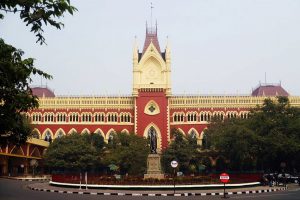Calcutta High Court: Sabyasachi Bhattacharya, J. directed a case concerning the arrest of a freelance journalist to be listed for hearing in January, 2020 and also directed the respondents to file their affidavit(s)-in-opposition withe thin a fortnight from date. It also directed the concerned government officials to preserve and secure the entire CCTV footage of the Khardah police station of the concerned date.
In the present case, the appellant a spokesperson for the opposition party is a journalist who runs two vernacular newspapers and YouTube channels. It is alleged by the petitioner that he was forcibly whisked away by the police on 17-10-2019. When asked, the police replied that he had been arrested for a cyber crime case in Purulia District Cyber Crime Police Station. The petitioner contended that due to his exposure to corruption in political quarters, he has earned the wrath of the ruling party and therefore his arrest is on baseless allegations.
The counsel appearing for the petitioner argued that under the sections he was booked the police cannot initiate an investigation on their own, until an order of a competent Magistrate. Placing reliance on the Arnesh Kumar v. State of Bihar, (2014) 8 SCC 273 it was contended by the petitioner that in the said judgment it was remarked by the Supreme Court that a notice of appearance in terms of Section 41A of the Code of Criminal Procedure, 1973 has to be served on the accused within two weeks but he was not served the same. The counsel then contended that as an interim measure it should be stayed on.
The counsels for the respondent State argued that the investigation is still at a nascent stage and ought not to be stayed at this premature juncture. It was argued that there were several safeguards available to the petitioner under the CrPC, all of which provide sufficient relief to the petitioner even at the stage of further investigation.
The Court opined that it is not clear at all as to how the criticism of the State Government or a Member of Parliament could be deemed to be the publication of a statement likely to cause fear or alarm to the public at all. The court continued that the people always have a right to criticize the Government or the Executive and even the Judiciary and the Legislature are not exempt from fair criticism. That is what the freedom of speech and expression, as enshrined in the Constitution, is all about, the Court continued.
In this regard, the Court also observed that “there is a common misconception of identifying the ‘State’ with the ‘Government’. This may be a fallout of the failure of the Indian polity to implement the Constitutional vision as to separation of powers between the three wings of the Government, in particular among the Legislature and the Executive.”
The Court remarked that these allegations were baseless on the face of it and were not even maintainable against the petitioner in the context of the petitioner’s actions, on the basis of which such offences were alleged. But since counsel for both sides advanced detailed arguments even on the prayer for interim protection, the court listed this case for the month of January, and directed that the said complaint and the FIR shall remain stayed till disposal of the writ petition. [Sanmay Banerjee v. State of West Bengal, 2019 SCC OnLine Cal 3941, decided on 03-12-2019]

